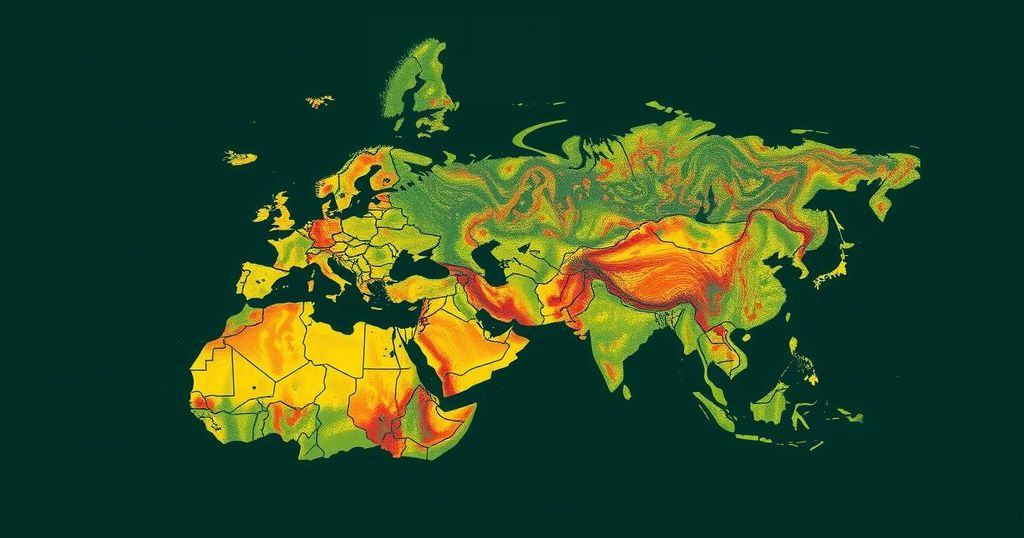Islamic Finance: A Solution for Climate Action and Community Resilience
The article discusses the impact of climate change on Muslim communities and presents Islamic finance as a viable solution to these challenges. It emphasizes the ethical principles of Islamic finance that support communities and the environment, highlights successful initiatives, and suggests that redirecting investments towards renewable energy could mobilize substantial resources for combating climate change.
Muslim communities globally are facing severe impacts from climate change, which threaten their livelihoods and cultural practices. Events such as devastating floods in Pakistan and rising sea levels in Indonesia illustrate this dire situation, as do persistent droughts affecting regions in the Middle East and North Africa. These climatic challenges not only jeopardize survival but significantly threaten food security, particularly during the holy month of Ramadan, where the ability to maintain food stocks becomes increasingly difficult amidst climate-induced shocks.
Addressing these challenges requires innovative approaches, with Islamic finance presenting an ethical framework rooted in principles that ensure fairness, social responsibility, and environmental stewardship. With its focus on ethical banking and charitable practices such as zakat and waqf, Islamic finance promotes sustainable development and financial activities that benefit communities and the environment. Financial institutions in various Muslim-majority countries have successfully financed renewable energy projects and environmental initiatives, evidenced by Malaysia’s green sukuk initiative and substantial investments in the UAE.
Despite its foundational alignment with sustainability, Islamic finance still possesses untapped potential to tackle the climate crisis effectively. A recent report from Greenpeace MENA and the Global Ethical Finance Initiative underscores that directing just 5% of Islamic finance assets, projected to grow to USD$ 6.7 trillion by 2027, toward renewable energy initiatives could mobilize around USD$ 400 billion by 2030. This funding could significantly boost efforts in climate resilience, biodiversity protection, and support vulnerable communities.
By transitioning from fossil fuels to renewable energy projects, Islamic financial institutions, exemplified by the Islamic Development Bank, can spearhead a shift towards sustainable practices in regions most impacted by climate change. Given the ethical principles of stewardship espoused by Islam, the intersection of Islamic finance and climate action is not merely a financial opportunity but a moral obligation. As the climate crisis continues to escalate, Islamic finance stands as a vital mechanism for promoting environmental and economic sustainability that resonates with the values of millions.
Advocating for increased investments in renewable energy solutions is essential. Therefore, individuals are encouraged to engage their Islamic banks to passionately support this transition toward sustainability and environmental advocacy.
The article underscores the disproportionate effects of climate change on Muslim communities worldwide, affecting their daily lives, food security, and cultural practices. It highlights the ethical framework of Islamic finance as a potential solution to these pressing environmental challenges. By emphasizing community upliftment and sustainable development, Islamic finance provides a morally grounded approach to confronting the climate crisis while aligning with broader global sustainability goals. It further discusses successful initiatives already in place within the Islamic finance sector and the opportunity for expanded investment in renewable energy.
In conclusion, Islamic finance possesses a significant opportunity to address the climate crisis, particularly in vulnerable regions. By leveraging its ethical foundations and redirecting investment towards renewable energy, this financial system not only serves as a progressive financial model but also fulfills a moral responsibility toward environmental stewardship. Urging cooperation between institutions and communities to embrace Islamic finance for sustainability efforts is crucial, ensuring protection for those most affected by climate change while promoting a sustainable and equitable future.
Original Source: www.greenpeace.org




Post Comment